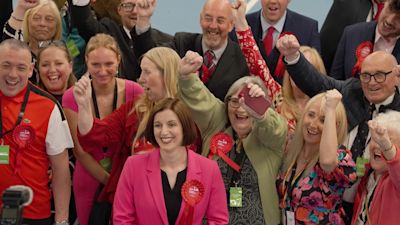Insight
Analysis: Labour and Reform UK combine to smash Conservatives in the North East

All sense of time may have been warped by staying up all night for these results, but it does feel incredible that the Hartlepool by-election was only just over three years ago.
Then, the Conservatives won more than 50% of the vote against 15 other candidates, taking a seat Labour had held for decades.
An inflatable version of Boris Johnson appeared, and there was talk about him being Prime Minister for a decade.
He'd already gained seven seats in our region at the 2019 general election, helped by a combination of Jeremy Corbyn's leadership and the 'Get Brexit Done' message.
In Hartlepool in May 2021, Labour still looked lost, and it's since been revealed that Sir Keir Starmer considered quitting as leader after that thrashing.
Fast forward to now, and he's on his way into Downing Street, with Labour holding all but one of the North East's constituencies.
It has been a remarkable turnaround in party political fortunes.
Labour regained old ground in their 'Red Wall' heartlands, and went further too, into true-blue territory.
Boundary changes complicate things but the Conservatives lost eight seats overnight, including rural heartlands like Hexham and North Northumberland (previously Berwick) that Labour have never held before.
The latter was a seat they were explicitly not targeting as of a few months ago.
The Tory vote collapsed pretty much everywhere, to the extent it was a shock to see Matt Vickers hold onto Stockton West (previously Stockton South) and at least get the Conservatives on the map in our region, gone 4 o'clock in the morning.
Reform UK did much of the damage, peeling off Conservative voters and finishing in second place, above the Tories, in more than half of the North East's seats.
An exit-poll suggestion that Reform could win a seat in Hartlepool came to nothing, as our first-past-the-post electoral system delivered Labour the spoils across the region.
Labour's vote share remained pretty static in many places, reflecting a relative lack of enthusiasm for the party that we've heard from many voters over the last few weeks.
More than anything this was a Conservative implosion, that dates back through Liz Truss' 49 days in office to the scandal of parties in Downing Street during the pandemic.
There is some legacy from the last 14 years in the devolution of powers to directly-elected mayors that now cover every part of our region.
But repeated rhetoric about 'levelling up' our region collided with the reality of a pandemic and cost-of-living crisis that preyed upon the poor.
The Levelling Up Minister Jacob Young lost his seat to Anna Turley, who he'd beaten last time around in Redcar.
That was where Rishi Sunak launched his battlebus last month, as the Tories sought to defend the Tees Valley stronghold they've built up in recent years.
Now, mayor Ben Houchen is looking isolated with only Vickers for Conservative company.
There was a little more relief for them in North Yorkshire.
'Whitby Woman', an undecided former Conservative supporter, was identified as a key target voter at this general election, and the Scarborough & Whitby constituency duly swung to Labour.
But the Tories held on in several other traditionally safe seats, including Richmond and Northallerton, where several opinion polls projecting the Prime Minister was going to lose his own seat were always unrealistic.
The beaten Conservatives I spoke to overnight were reluctant to damn Rishi Sunak personally.
He brought some stability over his 21 months in office, but failed to narrow the opinion polls, and gambled by calling the election for 4 July.
Those gambling allegations against some colleagues, and his gaffe in leaving D-Day commemorations also surely will have counted against the Conservatives.
It's unclear how long he may stick around as an MP, as his party tries to find its feet.
The Liberal Democrats did their share of damage to the Tories down south, though they are still struggling to be competitive in the North East.
Victory in Harrogate & Knaresborough gave them their first MP in our region since 2015.
A lot of Conservative voters here in 2019 seem to have moved over to Reform now, no doubt in part thanks to Nigel Farage's return as leader.
Their candidate in Cramlington & Killingworth admitted he was just standing on paper and was nowhere to be seen at the count, but still came second ahead of the Conservative incumbent.
Labour certainly campaigned hard, but with that vague message of 'change.'
Starmer moving them to the political centre ground played a big part in this triumph, but may soon leave some wondering whether there will be really be enough change going on.
His team inherit some very tight public finances, and have said, for example, that means they can't commit to scrapping the controversial two-child benefit cap, despite the arguments that it contributes significantly to child poverty.
They have talked about working closely with mayors and creating green jobs in regions like ours.
But, even if it's not called 'levelling up' any more, those regional inequalities are wide and deep.
The results are worth celebrating, but the North East's, and the country's challenges will be Labour's problems now.
Have you heard our new podcast Talking Politics? Every week Tom, Robert and Anushka dig into the biggest issues dominating the political agenda…